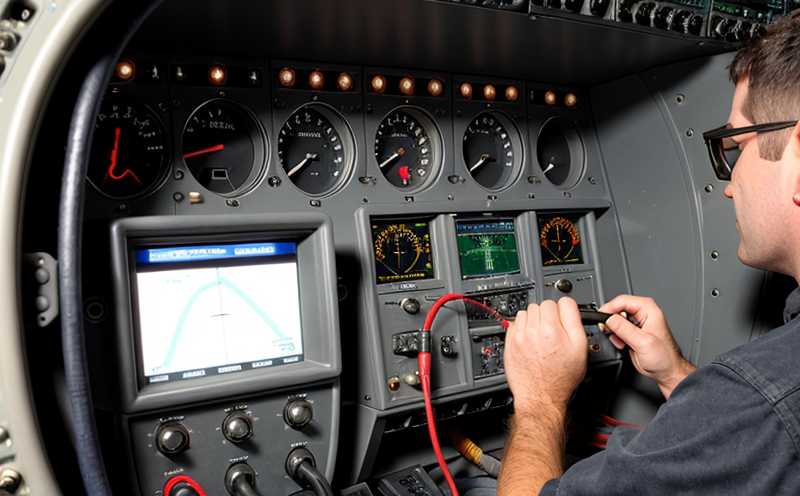FAA TSO-C195 Traffic Collision Avoidance System Testing
The FAA TSO-C195 specifies performance standards and testing requirements for Traffic Collision Avoidance Systems (TCAS) used in civil aviation. These systems play a critical role in enhancing safety by providing pilots with information that helps them avoid potential mid-air collisions. This service focuses on ensuring compliance with these stringent regulations, offering comprehensive testing solutions to meet the demands of this sector.
In aerospace and aviation, TCAS is an integral part of modern aircraft safety systems. The system uses a combination of transponders and interrogators to detect other aircraft within a certain range. By analyzing altitude, speed, and trajectory data, it calculates potential collision risks and alerts pilots accordingly. This critical function underscores the importance of thorough testing.
Our testing services are designed to ensure that TCAS systems meet all FAA requirements as specified in TSO-C195. We provide a full suite of testing capabilities, including functional tests, environmental stress screening (ESS), and electromagnetic compatibility (EMC) checks. This ensures the system operates reliably under various conditions.
Our team of experts employs state-of-the-art equipment to simulate real-world scenarios that TCAS might encounter during flight. These include altitude changes, speed variations, and proximity to other aircraft. The tests are conducted in controlled environments that replicate the operational parameters outlined in TSO-C195.
The testing process involves several key steps. Initially, we perform a thorough inspection of the system’s hardware and software components. This includes verifying all connections and ensuring proper calibration of sensors and transponders. Once the initial setup is complete, functional tests are conducted to ensure that each component operates as intended.
Following the functional tests, environmental stress screening (ESS) is performed to evaluate the system's resilience under various conditions. ESS simulates the harsh environments that aircraft might encounter during flight, such as extreme temperatures and humidity levels. This step ensures that the TCAS remains operational even in challenging conditions.
Finally, electromagnetic compatibility (EMC) checks are conducted to ensure that the TCAS does not interfere with other on-board systems or be susceptible to external interference. EMC tests are critical for maintaining the overall safety and reliability of an aircraft's electronics suite.
The results of these tests are meticulously documented and reported in compliance with FAA standards. Our reports provide detailed insights into the performance of the tested TCAS, highlighting any areas that require further attention or improvement. This comprehensive approach ensures that our clients can confidently meet all regulatory requirements and enhance their product offerings.
| Test Phase | Description | Key Objectives |
|---|---|---|
| Functional Testing | Verification of system components and their interactions. | Ensure all components operate as specified in TSO-C195. |
| Environmental Stress Screening (ESS) | Evaluation under extreme environmental conditions. | Assess system reliability and durability. |
| Electromagnetic Compatibility (EMC) Testing | Evaluation of interference with other on-board systems. | Ensure system compatibility and resilience to external signals. |
The FAA TSO-C195 Traffic Collision Avoidance System Testing is a critical service for aerospace manufacturers and operators. By adhering to these standards, we help ensure the safety and reliability of aviation systems, contributing to a safer skies for all travelers.
Scope and Methodology
- Functional Testing: Verifies the proper operation of each component within the TCAS system.
- Environmental Stress Screening (ESS): Simulates extreme environmental conditions to assess system durability.
- Electromagnetic Compatibility (EMC) Testing: Ensures the TCAS does not interfere with other on-board systems and is resilient to external signals.
The scope of our testing encompasses all aspects of the TCAS system, from hardware to software. We employ a multi-stage approach that begins with initial inspections followed by functional tests. This is followed by ESS to evaluate performance under extreme conditions, and concludes with EMC checks for interference resistance.
Our methodology ensures thoroughness and accuracy in every stage of testing. By adhering strictly to FAA TSO-C195 standards, we provide reliable and repeatable test results that are essential for compliance and safety.
Why Choose This Test
- Regulatory Compliance: Ensures strict adherence to FAA TSO-C195 requirements, which is mandatory for TCAS systems in civil aviation.
- Enhanced Safety: Through rigorous testing, we ensure the reliability and performance of TCAS under all operational conditions.
- Global Recognition: Compliance with FAA standards ensures that the tested system meets international safety and quality benchmarks.
- Pilot Confidence: Reliable TCAS systems enhance pilot trust in their equipment, leading to safer operations.
Choosing this test is crucial for manufacturers aiming to ensure their products meet the highest standards of aviation safety. By selecting our services, you gain access to expert testing capabilities that are essential for regulatory compliance and operational reliability.
International Acceptance and Recognition
- FAA Certification: Compliance with FAA TSO-C195 is recognized globally as a benchmark for aviation safety standards.
- IATF 16949: Our testing processes adhere to the international automotive quality standard, ensuring robust quality assurance practices.
The FAA TSO-C195 Traffic Collision Avoidance System Testing is widely recognized and accepted across the aviation industry. Compliance with these standards not only ensures regulatory approval but also enhances the reputation of your product in the global market. Our testing services are designed to meet or exceed international acceptance criteria, providing peace of mind for manufacturers and operators.





